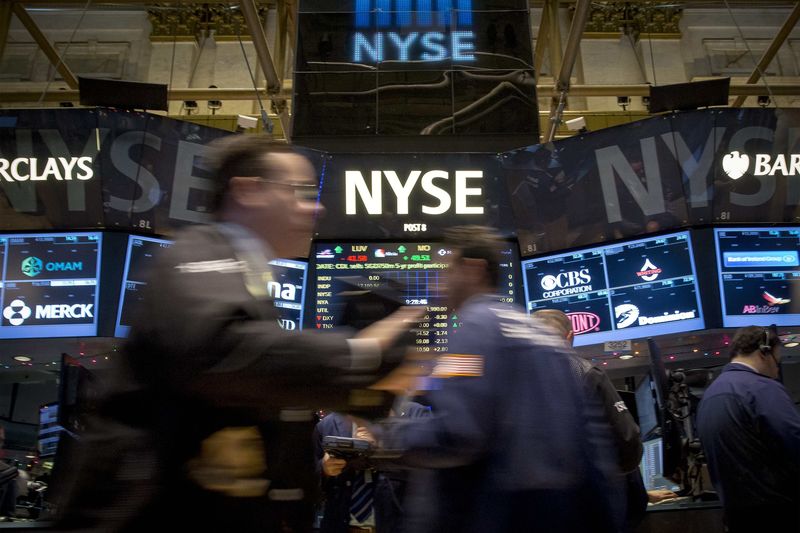* MSCI ACWI hits record high; Apple leads tech shares
* Relief over U.S.-Iran tensions support sentiment
* Emerging market currencies at 1-1/2-year highs
* Gold, safe-haven currencies, oil all weaker
* European stock futures up 0.3-0.4%
By Hideyuki Sano
TOKYO, Jan 10 (Reuters) - World shares hit a record high on Friday as relief over the de-escalation of U.S.-Iranian tensions prompted investors to bet on faster global growth, especially in the technology sector.
Equities markets quickly erased losses that followed missile attacks from Iran targeting U.S. forces in Iraq, as the two countries moved to defuse the tensions.
"On top of easing tensions in Iran, optimism on U.S. corporate earnings are fuelling sentiment. The euphoria is coming back to the markets," said Masanari Takada, cross asset strategist at Nomura Securities.
MSCI's broadest gauge of the world's stocks in 49 countries .MIWD00000PUS rose modestly to hit an all-time high and its index of Asia-Pacific shares outside Japan .MIAPJ0000PUS gained 0.44% to its best levels since June 2018.
Japan's Nikkei .N225 rose 0.44% while Chinese shares .SSEC slid a little but stood not far from their eight-month peaks.
European shares look set to gain, with pan-European Euro Stoxx 50 futures STXEc1 trading up 0.29%, German DAX futures FDXc1 up 0.26% and FTSE futures FFIc1 up 0.42%.
That followed record-setting in the pan-regional STOXX 600 index in Europe .STOXX and the three major stock indexes on Wall Street on Thursday.
The S&P 500 .SPX gained 0.67%, with its technology sector rising more than 1%. Apple AAPL.O gained 2.1%, helped by news that sales of its iPhones in China in December jumped more than 18% on year. .N
Investors welcomed the report as a prelude to the upcoming visit by China's Vice Premier Liu He, head of the country's negotiation team in Sino-U.S. trade talks, to Washington next week to sign a trade deal with the United States. will have a symbolic event of Sino-U.S. dialogue. Given the current strength of the market, it is hard not to expect this rally to continue for the time being," said Norihiro Fujito, chief investment strategist at Mitsubishi UFJ Morgan Stanley (NYSE:MS) Securities in Tokyo.
While analysts expect slight declines in profits for S&P 500 companies in the last quarter, they see a solid recovery this year.
"Unless we have external shocks such as resurgence of U.S.-China trade tensions or a war in the Middle East, it is hard to see the U.S. economy falling apart," said Hiroshi Watanabe, senior economist at Sony Financial Holdings.
"There could be great rotation to stocks from bonds. Emerging markets are likely to benefit from investors' bullish mood too," he added.
MSCI's emerging market currency index .MIEM00000CUS hit 1-1/2-year highs, having risen 0.4% so far this week in what is likely to be its sixth straight week of gains as it has also benefitted from three U.S. rate cuts last year.
Waning worries about all-out war in the Middle East pushed down gold, safe-harbour currencies and oil.
Gold XAU= eased 0.3% to $1,547.8 per ounce from a seven-year high of $1,610.90 hit right after Iran's missile attack on Wednesday.
Against the yen, the U.S. dollar traded at 109.52 yen JPY= , having hit a two-week high of 109.58 in U.S. trade on Thursday.
The euro stood little changed at $1.1105 EUR= , having fallen to $1.10915 during U.S. trade, its lowest in about two weeks.
Sterling fell to a near two-week low against the dollar after Bank of England Governor Mark Carney said there could be a "relatively prompt response" from the central bank if the current spell of economic weakness persisted. pound last stood at $1.3081, having fallen to as low as $1.3014 in the previous session.
Oil prices were sharply lower from their highs hit in the wake of Iran's missile attack.
U.S. West Texas Intermediate (WTI) crude CLc1 fell to as low as $58.66 per barrel on Thursday and last stood at $59.38, down 0.3% on the day, compared with Wednesday's peak of $65.65.
(Editing by Lincoln Feast and Jacqueline Wong)
